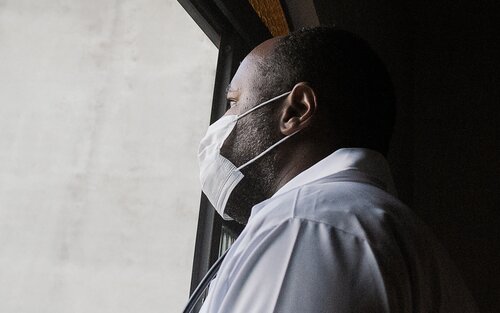The survey of 28 African countries was undertaken as part of the first global examination of the devastating impact of COVID-19 on access to mental health services and underscores the urgent need for increased funding. 37 percent of the countries responding in the African region reported that their COVID-19 mental health response plans are partially funded with a further 37 percent saying they have no funds at all. This comes as the COVID-19 pandemic increases the demand for mental health services.
Commenting on the finding, WHO Regional Director for Africa Dr. Matshidiso Moeti said isolation, loss of income, the deaths of loved ones, and a barrage of information on the dangers of this new virus can stir up stress levels and trigger mental health conditions or exacerbate existing ones. “The COVID-19 pandemic has shown, more than ever, how mental health is integral to health and well-being and must be an essential part of health services during outbreaks and emergencies.”
According to data by the organization, African countries account for 15 of the top 30 countries globally for suicide per 100 000 people. While there is scant data on how COVID-19 is increasing mental health conditions on the African continent, one study in South Africa found that 10–20 percent of the 220 people surveyed reported potent experiences of anxiety and fear as a result of the pandemic.
Another survey of 12 000 women in low-income communities in Uganda and Zambia found an increase in persistent stress, anxiety, and depression. The WHO assessment of mental health services took place in July and August 2020 and 27 of the 28 African nations which responded have included mental health in their COVID-19 response plans, underscoring the growing recognition of the importance of this once neglected area of health.
According to the survey, substance use disorder services were the mental health services facing the biggest disruptions in the continent. The main causes for the disruptions were due to patients failing to turn up, travel restrictions hindering access to health facilities, and a decrease in patient volume due to cancellations of elective care.
The survey also indicates that governments on the continent have set up counseling helplines and increased training for key health responders in basic psychosocial skills. Prior to the pandemic, WHO says that the region had one of the lowest mental health public expenditure rates, at less than US$ 10 cents per capita.
The report further states that with increasing pressure on health systems and rising demand, stretched and chronically underfunded mental health services are under increasing strain. “COVID-19 is adding to a long-simmering mental health care crisis in Africa. Leaders must urgently invest in life-saving mental health care services,” said Dr. Moeti.
“We also need more action to provide better mental health information and education, to boost and expand services, and to enhance social and financial protection for people with mental disorders, including laws to ensure human rights for everyone.”
Data by the Ministry of Health in Kenya indicates that depression and anxiety disorders are the leading mental illnesses diagnosed in the country, followed by substance use disorders.Among the different types of substances, alcohol contributes to the largest burden of substance use-related illnesses in Kenya. At the same time, alcohol abuse is most prevalent in the 18-29-year-old age group.
Margaret Njugunah

